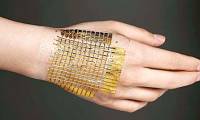
New electronic skins can wrap around the robot's hand, helping to accurately sense pressure and identify objects in conditions as cold as minus 78 degrees Celsius.

Scientists have successfully developed an artificial tactile system that can be used in creating prosthetic hands, helping robots have the ability to feel like humans.

Recently, scientists have made a big step in the development of electronic skin integrated with artificial hair.

The Israeli Institute of Technology (Technion) said on June 11 that Israeli researchers have successfully developed artificial skin that can restore itself.

New types of electronic leather have durable properties and low production costs, promising to bring many positive changes in the health care sector.

According to research published in Science Advances newspaper, this device is basically a thin film of integrated sensor capable of measuring pressure, temperature and humidity.

Scientists have successfully built materials that can sense pressure like human skin.

If researched and developed successfully, electronic skin will become a new hope for people with disabilities who can experience pain and feel about everything around them like

For the first time, Japanese scientists have demonstrated that an ultra-thin and flexible electronic display screen made from organic electronics does not impair tactile contact

Recently, Stanford University researchers have successfully developed an electronic device that functions as a human skin and in addition to the ability to change colors like a
 New electronic skins can wrap around the robot's hand, helping to accurately sense pressure and identify objects in conditions as cold as minus 78 degrees Celsius.
New electronic skins can wrap around the robot's hand, helping to accurately sense pressure and identify objects in conditions as cold as minus 78 degrees Celsius. Scientists have successfully developed an artificial tactile system that can be used in creating prosthetic hands, helping robots have the ability to feel like humans.
Scientists have successfully developed an artificial tactile system that can be used in creating prosthetic hands, helping robots have the ability to feel like humans. Recently, scientists have made a big step in the development of electronic skin integrated with artificial hair.
Recently, scientists have made a big step in the development of electronic skin integrated with artificial hair. The Israeli Institute of Technology (Technion) said on June 11 that Israeli researchers have successfully developed artificial skin that can restore itself.
The Israeli Institute of Technology (Technion) said on June 11 that Israeli researchers have successfully developed artificial skin that can restore itself. New types of electronic leather have durable properties and low production costs, promising to bring many positive changes in the health care sector.
New types of electronic leather have durable properties and low production costs, promising to bring many positive changes in the health care sector. According to research published in Science Advances newspaper, this device is basically a thin film of integrated sensor capable of measuring pressure, temperature and humidity.
According to research published in Science Advances newspaper, this device is basically a thin film of integrated sensor capable of measuring pressure, temperature and humidity. Scientists have successfully built materials that can sense pressure like human skin.
Scientists have successfully built materials that can sense pressure like human skin. If researched and developed successfully, electronic skin will become a new hope for people with disabilities who can experience pain and feel about everything around them like
If researched and developed successfully, electronic skin will become a new hope for people with disabilities who can experience pain and feel about everything around them like For the first time, Japanese scientists have demonstrated that an ultra-thin and flexible electronic display screen made from organic electronics does not impair tactile contact
For the first time, Japanese scientists have demonstrated that an ultra-thin and flexible electronic display screen made from organic electronics does not impair tactile contact Recently, Stanford University researchers have successfully developed an electronic device that functions as a human skin and in addition to the ability to change colors like a
Recently, Stanford University researchers have successfully developed an electronic device that functions as a human skin and in addition to the ability to change colors like a





 Do signals from extraterrestrial civilizations detected by Sky Eye really exist?
Do signals from extraterrestrial civilizations detected by Sky Eye really exist? 'City without air conditioning' in China: People don't know what heat is!
'City without air conditioning' in China: People don't know what heat is! The element of the sun god is giving scientists a headache
The element of the sun god is giving scientists a headache Unique Village: Roofs Become Roads for Residents!
Unique Village: Roofs Become Roads for Residents! Top 7 strange psychological effects of the brain that we all have without knowing
Top 7 strange psychological effects of the brain that we all have without knowing Which is the most terrifying bedroom elixir in Chinese history?
Which is the most terrifying bedroom elixir in Chinese history? Earth's core may start rotating in reverse
Earth's core may start rotating in reverse A day in Japan can be up to 30 hours long, does this country live in a different 'timeline'?
A day in Japan can be up to 30 hours long, does this country live in a different 'timeline'?